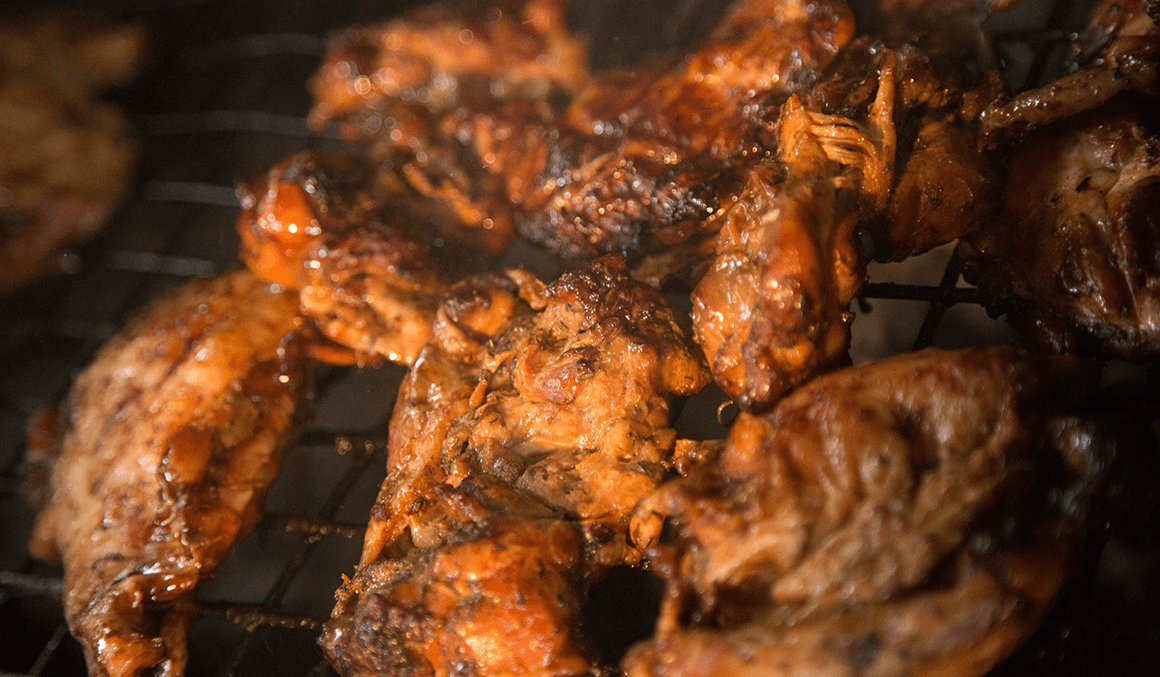Back to Basics: Why We All Need Soul Food with Chef Patrick Williams
An innate passion for good food
Patrick Williams is a straight talking career chef with a big personality, a character moulded by his childhood in London’s East End with an innate passion for good food and the impact it has on everyday lifestyles.
Having cut his teeth under the likes of Marco Pierre White and Richard Neat in some of the most exclusive eateries across London – including The Waldorf Hotel, The Ivy, and The Mirabelle – Williams forged a reputation for promoting food as a way of life, designing compelling menus and leading some of the most creative teams in the industry, leading to his first solo venture as the owner of the Terrace Restaurant in London Fields.
Now the owner of Caribbean food brand Soul Food, which resides in London’s Borough Market and soon to move into bricks and mortar, Williams is delivering the message of living well, with good, real food at the core.
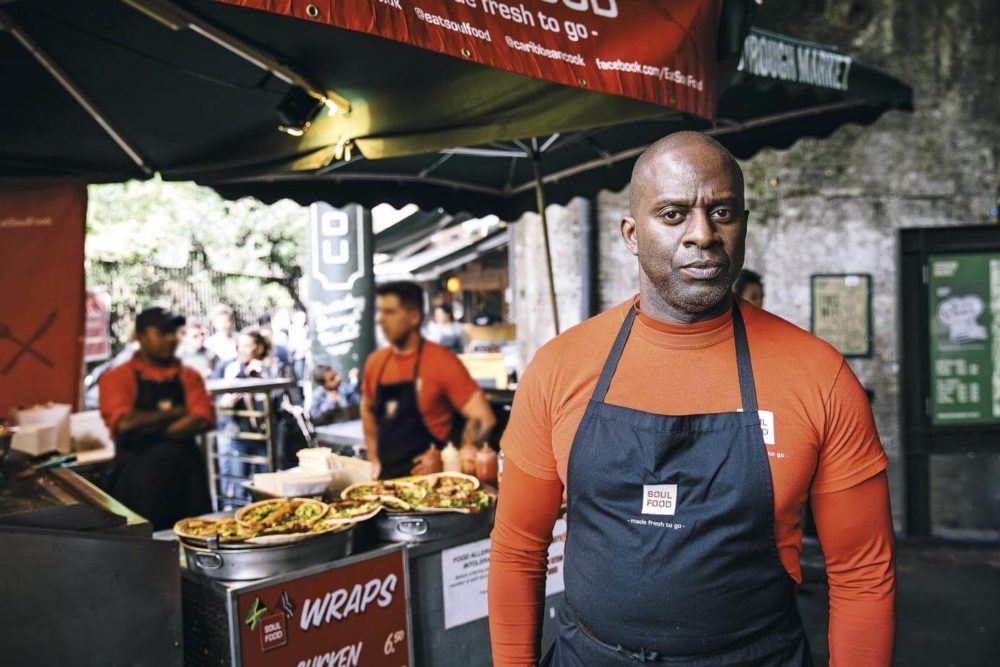
“Everybody is trying to be so clever these days, we seem to have forgotten what real food is,” says Williams, who is now focusing on creating a lifestyle brand stemming from Soul Food which incorporates health, wholesome meals and travel.
“My opinion is that everything is a little bit ‘same old’, I think there is room for a more educational stance around Caribbean food in particular, delivered in the right way, but also for people to understand the importance of the basics – healthy meals for the family, without over-thinking it,” he adds.
Fantastic home-cooked food

Brought up during the politically “interesting” Thatcher regime as a first generation British black child with Jamaican parents, Williams warmly remembers a childhood in London’s East End, and in particular, the fantastic home-cooked food he would enjoy each night after awful school dinners consisting of tasteless brown food.
A love for cooking
Williams’ love of cooking first took hold as a youngster at home then latterly through home economics lessons at school, which he used as a creative output and respite for him against an academic backdrop that he found personally unsuited to – developing a passion and drive that he believes all good chefs need to be successful.
“Food is a lifestyle and a passion for me; bringing together the standards and consistency of contemporary, modern cuisine with the simple, fresh, seasonal approach that brings out the depth and flavour of anything from the most basic foods to the most exotic of ingredients,” he says.
Positions at prestigious eateries
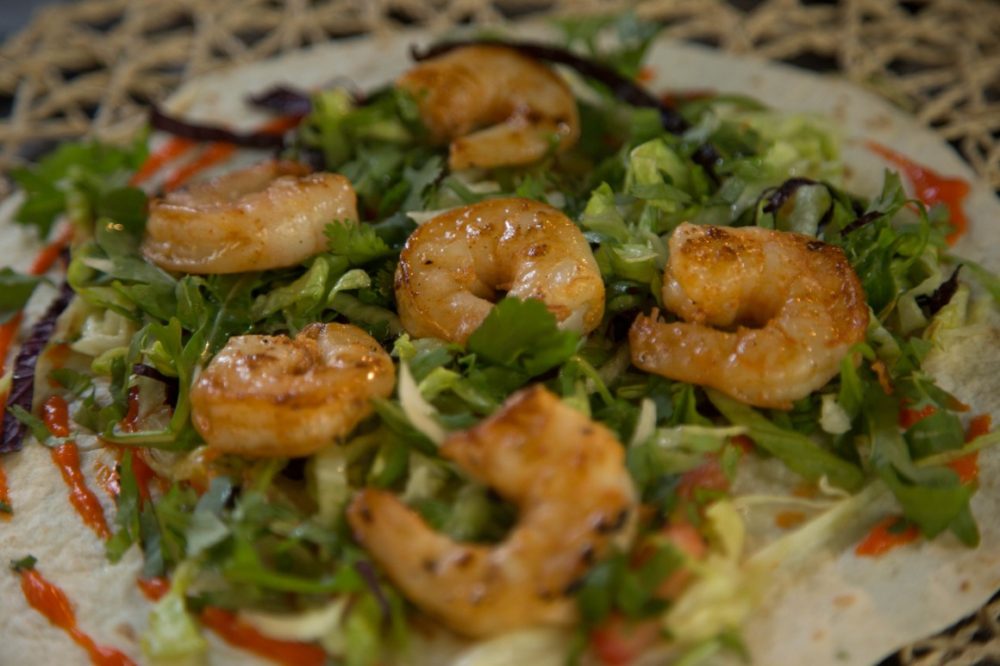
Early in is career Williams invested the time and hard work needed to gain as much knowledge as he could from leading chefs as well as in first class restaurants, which led to positions at prestigious eateries including canteen Chelsea Harbour and The Criterion & Titanic owned by the imposing Marco Pierre White.
“I remember those times with great affection,” say Williams “Experiences which stood me in great stead for my own ventures and played a huge part in establishing the correct values needed. Marco was obviously an imposing figure and would appear now and again to bark orders, but I also worked with other amazing chefs including Stephen Terry and Darren Bunn – they were fantastic characters,” he adds.
Not shy of saying what he thinks, Williams, himself an imposing character, has the additional quality of a sense humour, and a dry one at that.
Soul Food at Borough Market
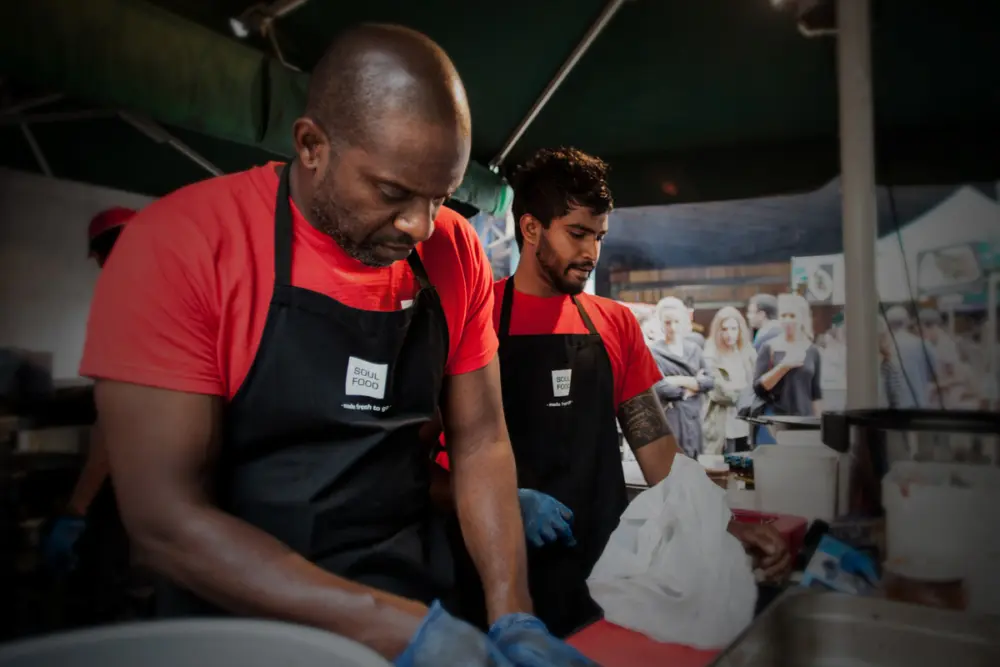
With Soul Food proving a big attraction within Borough Market, one of his focuses is to bring Caribbean food to the high street consumer, to a wider audience that understand it more, “I think Caribbean food still needs demystifying, which is unbelievable considering its roots here in the UK,” he adds “Much like Indian food, it needs to be promoted and sold in a different way so that people understand it and see it as part of the norm,” he adds.
“Everybody is trying to be so clever these days, we seem to have forgotten what real food is”
Williams now wants to move forward to the next stage of his career, which will see the emergence of Soul Food as a solid brand, but also himself moving back to the forefront to promote healthy food and healthy living as a “lifestyle mentor”, understanding that what we eat and consume is built into the foundations of our day-to-day living.
“I believe anyone can cook, but not always well. I want to help to educate people so that they understand the basics and find that drive and passion needed to make great food and great food choices,” he adds.
Williams is also a best-selling author with his book The Caribbean Cook, as well as having made numerous appearances on TV shows such as Saturday Kitchen. We were fortunate to spend some quality time in the company of the man himself, where we asked him about everything from the moment he first knew he wanted to cook for a living, to what he really thinks about modern-day TV chefs. You can read the full transcript below.
Patrick Williams: Full Q&A
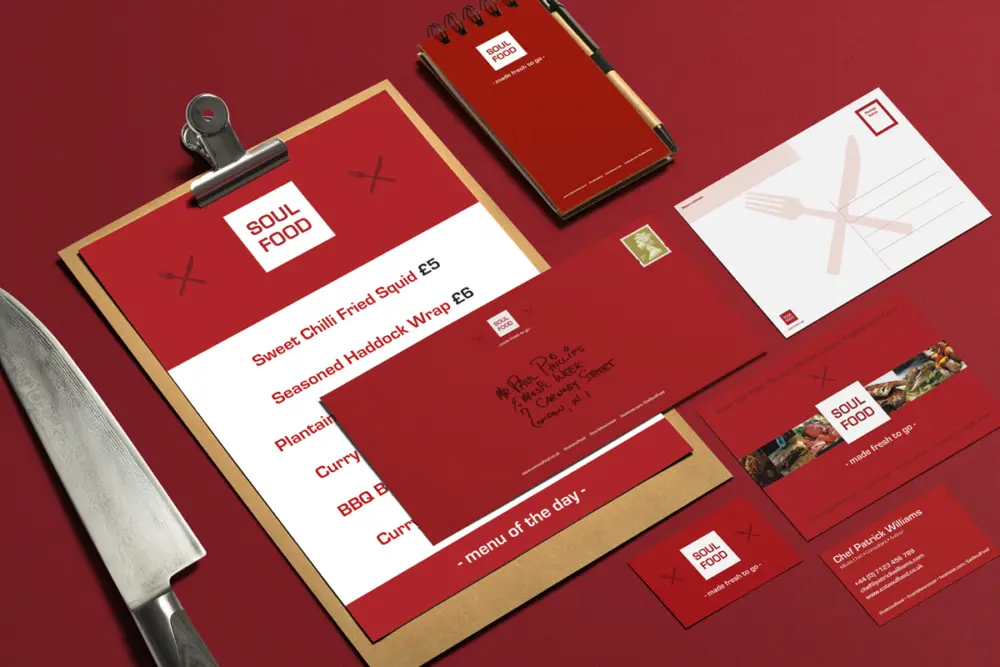
Ape: Can you tell us a little about where you are from?
Patrick: I was born in Hackney in East London and both my parents are Jamaican, my grandfather arrived in England during the 1950s.
Briefly explain life in the East End of London as you were growing up, a black English boy from first generation Jamaican parents?
I spent my early years in Hackney and then moved to East Ham, where I finished junior and secondary education. It was a very lively time within that political era – with Thatcher, right wing groups and SUS laws in full effect, you really had to have your wits about you, but still a fun time looking back.
This is the time that you started to notice the great food you were being provided with back at home?
I suppose being from the Caribbean, food was always a big part of the culture, so for me it just became second nature as it was one of the few things I loved to do. The huge gulf between tasteless brown food I was witnessing at school and the beautiful home-cooked food also made a difference.
What was the spark that then led to you wanting to cook for a living, how did the journey take shape?
I suppose it was down to home economics at school really, and finding it surprisingly interesting. This happened at around 13 years old, and it went from there. I was also never very academic and food gave me that much needed creative output and freedom. I then moved on to cooking school and into my career.
Was the idea for you to cook Caribbean food or did you have lots of different motivations? Can you explain a little?
The idea was to gain as much knowledge as possible from a cross section of top chefs and eateries. To be perfectly honest, I found it quite difficult as a black man with the various stereotypes, especially back in the 1980s, so over the years I became very frustrated and had to come up with my own plan. I also got quite bored with cooking bland food so just went back to basics and back to the reason I became a chef in the first place.
Your professional life has been really quite interesting and taken you to quite varied settings. Can you tell us about working for Marco Pierre White and then having your very own restaurants?
Over a number of years I worked at the canteen Chelsea Harbour, The Criterion and Titantic, which was owned by Marco Pierre White.
He would appear from time to time to drill his captains, should we say, and of course was a hugely imposing figure barking orders to everyone in the kitchen – and sometimes beyond.
Working under him were his staff boys from Harvey’s – chefs like Stephen Terry, who was a great chef and bit of a lovable lunatic.
These experiences stood me in good stead for my own ventures in terms of work ethic and idea generation. It really was priceless.
You were one of the very first TV chefs. Can you explain a little more about the shows you did and the type of cooking they wanted you to do?
I’m not sure I was one of the very first but definitely during the cusp of chefs becoming more prominent within TV programmes.
It was a format that they had, which I then had to fit into. To be perfectly honest I think you need to find the personality first and then build around their strengths, that would be my only criticism during my time.
I’ve appeared in Yes Chef, on CBEEBIES, Planet Xmas, Home Cooking with Rachel Allen, Saturday Kitchen, Sky One with Lorraine Kelly, Taste TV, amongst many others.
Did you enjoy it?
Some shows were fantastic to work on but others were a little more testing, should I say.
How do you feel about the platform TV chefs now get. Do you feel it’s good TV or perhaps a little over indulged?
I hand-on-heart think it’s great. I think the nation has embraced cooking and cookery programmes and we have some amazing characters on TV. However, I do believe there is room for more and that it can often be a little bit ‘same old’.
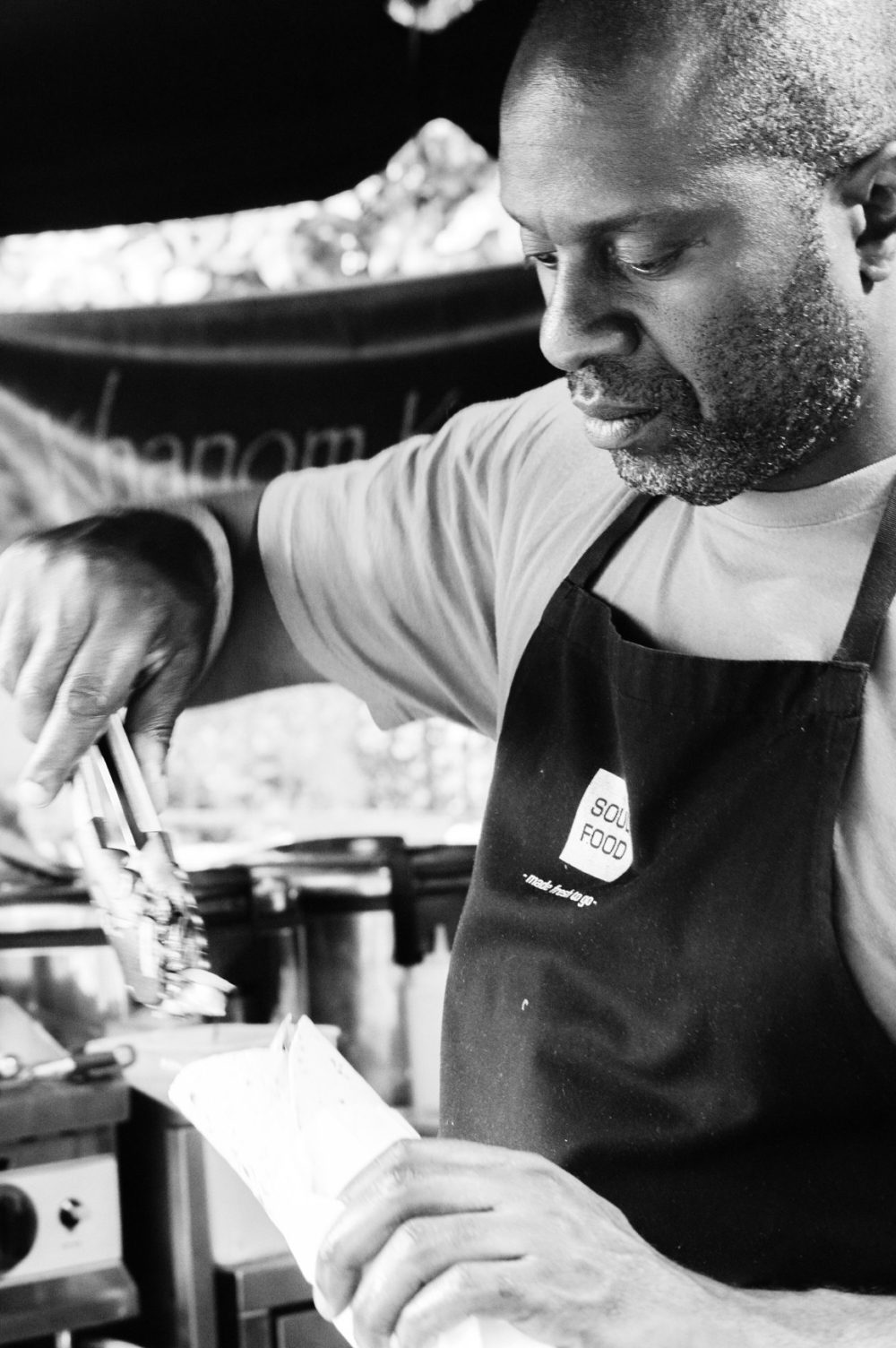
Do chefs have to be horrible in the kitchen, what’s the secret?
Well that is a popular perception and I wouldn’t go as far to say it is a misconception. I don’t think chefs have to be nasty, but I do believe it helps to have a Jekyll & Hyde personality in terms of maintaining control, creativity and excellence in standards.
Can anybody cook, or do you think there’s a certain make-up needed. If so, what is it?
Yes, I believe anyone can cook, but not always well. For me you need to be driven and have passion for your food. What I’m doing now is positioning myself as a lifestyle mentor, to help people understand the basics of good cooking and ingredients, which I hope will unearth that passion needed to get to the next level.
What do you think is missing from TV cooking programmes?
With my tongue firmly in my cheek I will say me. However, I do think that there is room for more characters and I would enjoy being myself, passing on my experience in front of camera.
We all cook, or should cook, so the audience is vast and therefore there will be a natural interest in seeing what new people have to say.
You now run Soul Foods. Can you divulge a little more about the brand and where it all started?
I think it’s always been inside me and at this stage of my career I’m ready to take my food in another direction and grow a solid brand not only with Soul Foods and our offering, but also pushing myself forward again as a lifestyle mentor in relation to food.
Traditionally recognised as a street food, what do you feel people should be experiencing with Caribbean cuisine – perhaps to those who have never experienced it before?
Caribbean food still needs demystifying, which is unbelievable considering the relationship between the islands and the U.K.
So, like Indian food it needs to be promoted and sold in a different way so people understand it and see it as the norm. Key to that is accessibility, and that for me means developing a high street brand.
Most people think Caribbean means spicy, but it brings so much more to the table. It’s a matter of getting that new message out there to the masses in a completely organic way.
There seems to be a lack of focus on good old hearty family meals, exactly the nostalgia conjured by you talking about those early days as a school boy? Agree?
I think there is an element of truth in that statement. However, I do see a shift back to a focus on easy, manageable cooking on TV. I think Tom Kerridge does a really good job.
I also think a lot of people are trying to be so clever with food, that we have forgotten what real food is.
Can you shed the ‘Patrick Williams’ light on seemingly contentious issues such as Jamie Oliver making his own jerk rice and how you feel about things like that?
I really don’t see it as contentious, to be honest.
Caribbean is a relatively untapped market, so why wouldn’t someone fill the gap? Should Ainsley or Levi Roots have come up with the idea? Would it have been a less bitter pill to swallow? I don’t think so, just an entrepreneur making cash and I think we need to be less obsessed with barriers in cooking.
I guess you love a bit of pie and mash as an East End boy? Jellied eels?
Ha ha ha. I hate them both. Pie and mash with liquor is disgusting, I had it on East Ham high street one lunch time while at school and I can firmly say I’ll never have it again!
What do you think you want to do now and for the next five years. You have a wealth of experience, huge in fact?
So the next five years must be about building a brand, hopefully opening numerous sites for Soul Foods to extend that key understanding of Caribbean food. I also personally want to become more prominent in passing on my experience and expertise in terms of understanding what good, healthy food is and how to cook well – maybe with a Caribbean reference here and there.
Nutrition and fitness are both very important to you. Ever thought about becoming a reformed lifestyle guru?
Going forward I think that lifestyle focus is very important. It will incorporate a lot of what I already do, including travelling, but in essence I have this wealth of knowledge and experience that I would like to utilise in my own way, which could be really fun.
Visit eatsoulfood.co.uk for more information and to have your tastebuds blown away.
